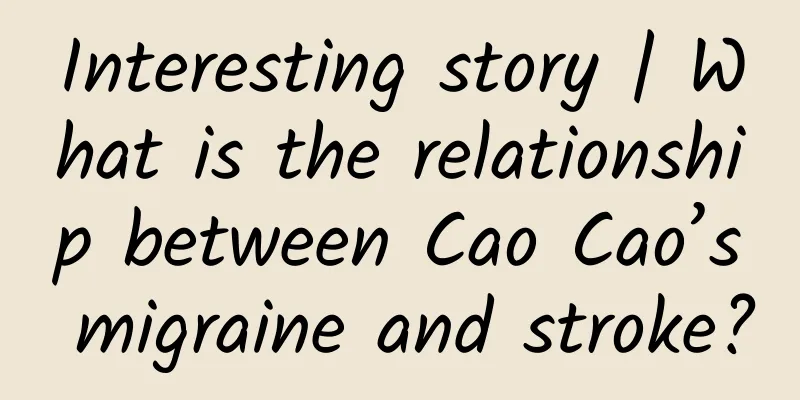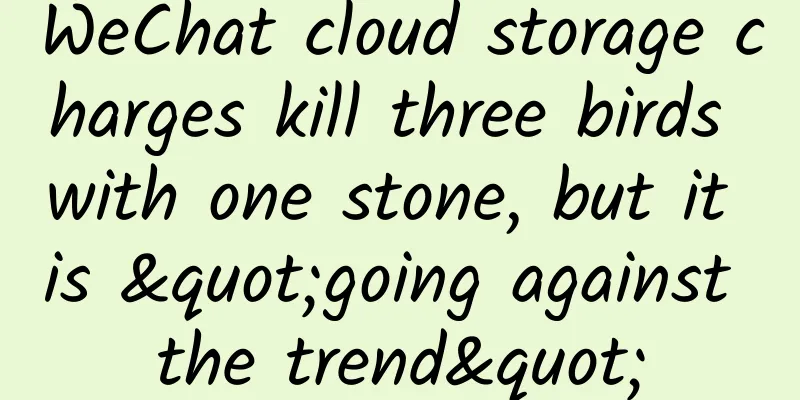Interesting story | What is the relationship between Cao Cao’s migraine and stroke?

|
Cao Cao was a famous politician, military strategist, and writer during the Three Kingdoms period. He was also one of the main characters in the Romance of the Three Kingdoms. In the Romance of the Three Kingdoms, the author Luo Guanzhong used a lot of words to describe Cao Cao's "head wind" disease. What is "head wind"? What is its relationship with stroke in modern medicine? This article will briefly analyze this issue from the perspective of history and medicine. What is "head wind"? "Head wind" is a general term for certain head diseases in ancient times, mainly manifested by headache, dizziness, nausea, vomiting and other symptoms. According to the description in "Romance of the Three Kingdoms", when Cao Cao's "head wind" attacked, he would feel "splitting headache, restless", and even "horrified, cold sweat". These symptoms show that Cao Cao's "head wind" was not a common migraine or neuralgia, but a more serious intracranial disease. What disease might Cao Cao’s “head wind” be caused by? Some people believe that Cao Cao's "head wind" may be caused by cerebral infarction, brain tumor, increased intracranial pressure and other diseases. These diseases all fall into the category of stroke in modern medicine. Stroke refers to a series of neurological dysfunctions caused by cerebral ischemia, hypoxia or hemorrhage due to blockage or rupture of cerebral blood vessels. Stroke can be divided into two categories: ischemic stroke and hemorrhagic stroke. Ischemic stroke refers to a stroke caused by cerebral blood vessels being blocked by thrombus or atherosclerosis, resulting in local ischemia and hypoxia of the brain. Hemorrhagic stroke refers to a stroke caused by rupture of cerebral blood vessels due to hypertension, arterial malformations and other reasons, resulting in intracerebral hemorrhage. So, what kind of stroke did Cao Cao's "head wind" belong to? To answer this question, we need to analyze Cao Cao's onset and cause of death. Cao Cao's illness and cause of death According to historical records such as Romance of the Three Kingdoms and Records of the Three Kingdoms, Cao Cao had at least four obvious "headache" attacks in his life. The first time was in the 12th year of Jian'an (207), when Cao Cao led his army to attack Yuan Shao. After hearing the anti-Cao manifesto written by Chen Lin, he got angry and had a headache, but then miraculously got better. The second time was in the 19th year of Jian'an (214), when Cao Cao attacked Hanzhong, he had a headache due to cold weather and overwork. The third time was in the 24th year of Jian'an (219), when Cao Cao heard in Xuchang that Ma Chao attacked Han Sui, he had another headache. Cao Cao's disease was never cured, and he eventually died of a headache. Judging from these attacks, Cao Cao's "head wind" seems to be related to his mood swings, climate change, physical exertion and other factors. These factors may cause cerebral vasoconstriction or dilation, thus causing ischemic or hemorrhagic stroke. However, if we carefully analyze the cause of Cao Cao's death, we will find that he is more likely to die of hemorrhagic stroke. According to the Records of the Three Kingdoms, Cao Cao was blind when he died. This phenomenon indicates that Cao Cao had optic nerve damage or retinal hemorrhage before his death. Optic nerve damage or retinal hemorrhage is more common in hemorrhagic stroke, especially intracerebral hemorrhage caused by hypertension. Although we cannot be sure whether Cao Cao had hypertension as an underlying disease, considering his long-term military and political activities, great mental stress, uncontrolled diet, and love of drinking and other lifestyle habits, he is likely to have hidden dangers of hypertension or other cardiovascular and cerebrovascular diseases. In addition, the "Three Kingdoms" also records that after Cao Cao's death, "the coffin was opened and examined", that is, an inspection was carried out. This process may provide us with clues to determine whether he died of hemorrhagic stroke. If he died of ischemic stroke, then the autopsy should show obvious softening or necrosis in one of his brain areas; if he died of hemorrhagic stroke, then the autopsy should show obvious bleeding or effusion in one of his brain areas. Unfortunately, the "Three Kingdoms" did not record the autopsy results in detail, only saying that "his heart was as big as a bucket", that is, the heart was abnormally enlarged. This phenomenon may also indicate that Cao Cao had heart problems, which in turn affected his brain health. Conclusion In summary, we can speculate that Cao Cao's "head wind" may be a hemorrhagic stroke, and is related to his own hypertension or other cardiovascular and cerebrovascular diseases. Of course, this is only a preliminary hypothesis and cannot completely rule out other possibilities. If there is more reliable historical data or medical evidence to support or refute this hypothesis, then we can get closer to the truth. According to the description in "Romance of the Three Kingdoms", Hua Tuo believed that Cao Cao's headache was caused by a substance called "wind saliva" in the skull, which required craniotomy to remove. This "wind saliva" may refer to bleeding or fluid accumulation in the brain. If this is the case, then craniotomy is indeed a possible treatment method. However, craniotomy also has great risks, especially under ancient medical conditions, which may cause complications such as infection, bleeding, and nerve damage. Moreover, even if the "wind saliva" is successfully removed, it cannot guarantee that Cao Cao will not have another stroke, because the root cause of the stroke may be his high blood pressure or other cardiovascular and cerebrovascular diseases. Therefore, I think whether Hua Tuo can cure Cao Cao's headache depends on many other factors. |
<<: Fight the "stomach" battle well, stay healthy and happy without "stomachache"
>>: [Popular Science] Is the Earth the only habitable planet in the universe?
Recommend
Different flavors of dependency injection in Swift
Preface In previous articles, we looked at some d...
What issues should be paid attention to when editing Baidu Encyclopedia, so as to create Baidu Encyclopedia entries 100% successfully?
What issues should be paid attention to when edit...
App Store Data Analysis for APP Promotion
There is a lot of data in the App Store, but for ...
The update rate of iOS 17 is sluggish, and more and more users don’t want to upgrade!
iOS 17 has been released for more than half a mon...
Beware! Wildfires are more likely to occur in autumn!
Wildfires are more likely to occur in autumn Ente...
Wall Street Academy: Key points of mergers and acquisitions of listed companies, practical operations and case analysis
Wall Street Academy's resources on key points...
How big is the pond? Scientists give the first accurate number
Almost everyone can identify a pond, but what exa...
Rocks are rocks, minerals are minerals? What are the differences?
Tuchong Creative First, let's look at the def...
Introduction to frequently used iOS third-party libraries and XCode plug-ins
Third-party libraries are something that programm...
Cases + Data | Is the effect of investment in the education industry poor? That’s because you didn’t choose the right channel!
Every year from July to September, when summer va...
How did Xianyu’s free delivery model with no source of goods achieve 500 orders a day? One order profit 2-7 yuan, net profit 2000+ a day
I have written articles about free gifts on Xiany...
520 copywriting topic marketing
How to do topic marketing on 520? We will proceed...
How much does it cost to be an agent of a points app in Ningbo?
How much does it cost to be an agent of a points ...
Ideal Auto: In March 2025, Ideal Auto delivered 36,674 new vehicles, a year-on-year increase of 26.5%
Recently, Ideal Auto announced that the cumulativ...
The more an ad looks like information, the more likely it is to be clicked? Please stop hurting your users.
There is a saying in current information flow ads...









![[Original] Free promotion of APP with zero budget in the early stage, just do these 17 points!](/upload/images/67cc1bcf40826.webp)